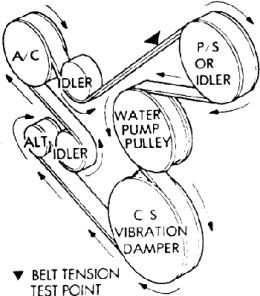Have you ever gone in for a routine oil change and the technician has recommended changing the serpentine belt? What was your reply? Did you decline the service with the idea that they were just trying to make more money? If your trusted technician recommends changing the serpentine belt, you might want to do it and save yourself a lot of trouble later.
First of all, exactly what is a serpentine belt? The serpentine belt is what powers the alternator, water pump, power steering, and air conditioning. Making sure your serpentine belt is in good condition and working correctly is essential in keeping your vehicle moving. A single belt, winding its way through a maze of pulleys drives every single engine accessory at the same time. This belt has a lot of responsibility.  Every time the belt passes around a pulley, it bends and flexes. This produces heat which causes the rubber to harden over time. The wear process can be greatly accelerated if the belt is loose or slips because any added friction makes the belt run even hotter. If you want to lengthen the life of the serpentine belt it is important to make sure it is properly tensioned and that the proper tension is maintained throughout its service life. Some signs that the tension isn’t correct can be a squealing belt, severe cracking on the belt, or a battery that keeps running down because of a slipping belt. If you are experiencing any of these symptoms or if your technician recommended changing your serpentine belt the last time you visited him, it’s time for a change. Don’t take the chance it won’t break on you, because when it snaps, all drive power is lost. The water pump quits circulating coolant through the engine, the alternator quits producing amps, the power steering pump stops assisting steering and the air conditioner quits cooling. We don’t want you to suffer the same consequences one of our customers did. They were told their serpentine belt had a lot of cracks and needed to be changed. They didn’t want to spend the $90 to $120 dollars that it costs to change the belt and left without the service. Two days later their car was being towed into our shop and their costs were now much more than the cost of changing the serpentine belt because of the collateral damage the broken belt had caused! Don’t let this happen to you! Make that initial investment that will end up saving you money down the road.
Every time the belt passes around a pulley, it bends and flexes. This produces heat which causes the rubber to harden over time. The wear process can be greatly accelerated if the belt is loose or slips because any added friction makes the belt run even hotter. If you want to lengthen the life of the serpentine belt it is important to make sure it is properly tensioned and that the proper tension is maintained throughout its service life. Some signs that the tension isn’t correct can be a squealing belt, severe cracking on the belt, or a battery that keeps running down because of a slipping belt. If you are experiencing any of these symptoms or if your technician recommended changing your serpentine belt the last time you visited him, it’s time for a change. Don’t take the chance it won’t break on you, because when it snaps, all drive power is lost. The water pump quits circulating coolant through the engine, the alternator quits producing amps, the power steering pump stops assisting steering and the air conditioner quits cooling. We don’t want you to suffer the same consequences one of our customers did. They were told their serpentine belt had a lot of cracks and needed to be changed. They didn’t want to spend the $90 to $120 dollars that it costs to change the belt and left without the service. Two days later their car was being towed into our shop and their costs were now much more than the cost of changing the serpentine belt because of the collateral damage the broken belt had caused! Don’t let this happen to you! Make that initial investment that will end up saving you money down the road.
